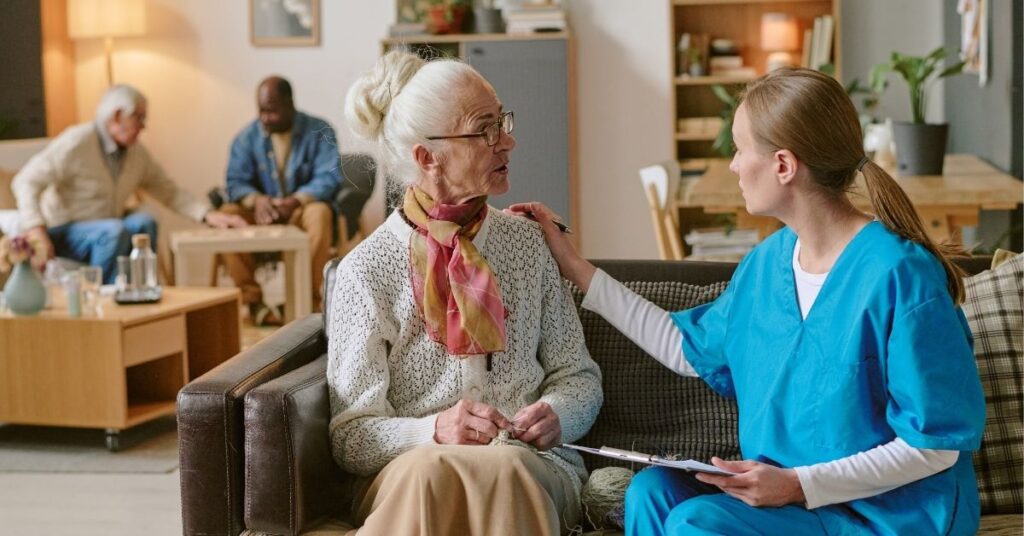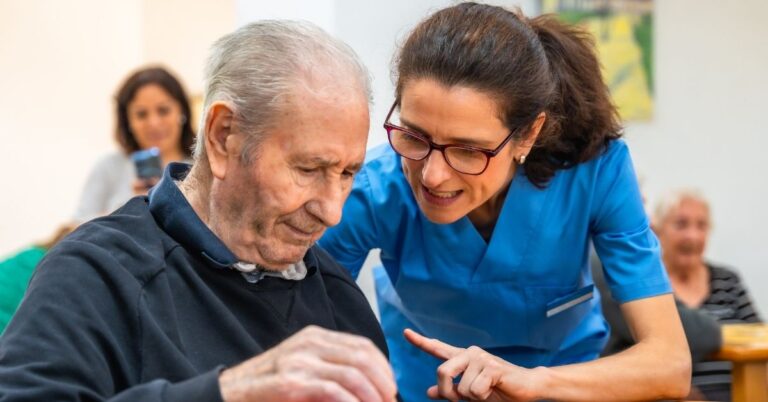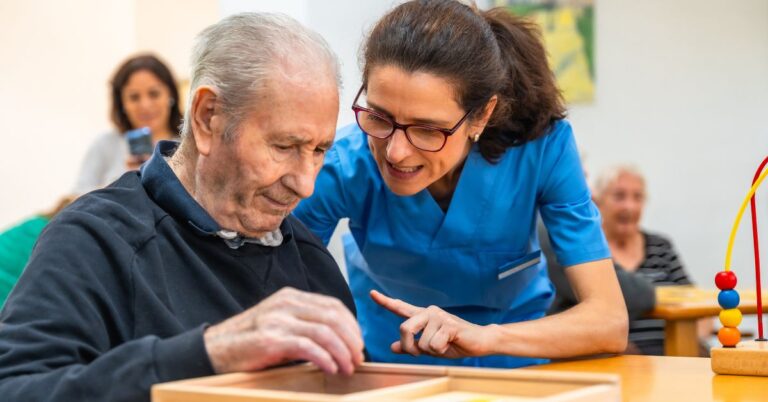Monday to Saturday - 8:00 -17:30
What to Look for in Staff Training of a Memory Care Community

Staff Training Makes All the Difference in Memory Care
Choosing a memory care facility in Lake Orion, MI, for someone you love feels overwhelming. You’re deciding about their protection, comfort and well-being during life’s most vulnerable stages. Among all the factors you’ll weigh—location, amenities, cost—the training level of the staff deserves your closest attention. The quality of that training will shape every interaction your loved one has daily.
Staff education is the foundation separating good memory care from exceptional care. When caregivers truly understand dementia, they respond with patience instead of frustration, creativity instead of routine and hope instead of resignation.
Understanding the daily realities of memory care
Dementia affects far more than memory. Your loved one may experience changes in behavior, sleep patterns and emotional responses that feel confusing or frightening. Caregivers encounter these challenges daily and without proper preparation, the emotional toll can be significant.
The medical complexities are equally demanding. Most seniors with dementia who require hospital care will experience behavioral and psychological symptoms—including agitation, aggression, wandering, hallucinations and sleep disturbances. These aren’t character flaws or willful behaviors; they’re symptoms of the disease process affecting the brain.
Staff members who understand the neurological basis of these behaviors can respond with empathy and appropriate interventions.
Essential Training Areas That Make the Difference
Your family member deserves care from staff who truly understand dementia. The right training program covers specific areas that directly impact daily life. Here’s what matters most when staff know their stuff.
Recognizing different types and stages of dementia
Staff need to understand that dementia isn’t just one condition. They should know the differences between Alzheimer’s disease, vascular dementia and Lewy body dementia. More importantly, they need to recognize how each stage affects your loved one—from subtle memory lapses in early stages to needing complete assistance later.
Responding to behaviors with understanding
Almost every person with dementia will experience behavioral changes at some point. The key is teaching staff to see these behaviors as communication. When someone wanders or becomes agitated, they try to tell us something. Good training emphasizes respect, even during challenging moments.
Communication that works
It takes a special and gentle approach to communicate with someone who has dementia. That’s why staff learn practical techniques, such as:
- Speaking slowly and using simple words
- Getting down to eye level and making gentle contact
- Using gestures along with words
- Never arguing about what someone believes is real

Helping with daily activities while preserving self-worth
People with dementia gradually need more help with basic tasks. Well-trained staff know the goal is to help while letting your loved one maintain as much independence as possible. They understand simple changes that make a big difference—using plates with contrasting colors. Hence, food is easier to see, choosing utensils that are easier to grip or even ensuring bathrooms feel safe.
Safety training that protects without restricting
Emergencies happen and staff must know how to respond when cognitive impairment is involved. This means having clear protocols for preventing wandering, managing falls and handling evacuations safely. During emergencies, staff should approach residents calmly, speak clearly and follow simple directions.
Your Family Deserves Exceptional Dementia Care
Staff training remains the heart of quality memory care for your loved one with dementia. We’ve explored how proper education shapes caregivers into compassionate professionals who truly understand the person behind the diagnosis. The appropriate training helps staff respond with empathy when facing the emotional and medical challenges of dementia.
Your loved one deserves staff who blend knowledge with genuine compassion. Visit Aion Care and experience firsthand our staff’s expertise. Schedule a tour by calling (586) 883-1932.
FAQs
Q1. What kind of training should staff have in a memory care facility?
Staff working in memory care should go through thorough, hands-on training. This includes understanding the different types of dementia, learning how to respond to behavioral changes with empathy, using clear and supportive communication and helping with daily tasks. They also need to be prepared for emergencies. Most importantly, the training should focus on person-centered care—treating each resident as an individual, not just a diagnosis.
Q2. What does person-centered care really mean in dementia training?
Person-centered care is all about seeing the person behind the condition. Staff learn to connect with residents’ personal histories, preferences and strengths. It also means understanding that behaviors often have meaning—residents may be trying to communicate something through their actions. The goal is to tailor care to each individual, making it as respectful, comforting and effective as possible.
Q3. How does staff training make a difference in residents’ lives?
Well-trained staff make a real difference in how residents feel and behave. They are better at handling difficult moments, which helps create a calm, supportive environment and leads to a much better quality of life for people with memory loss.



